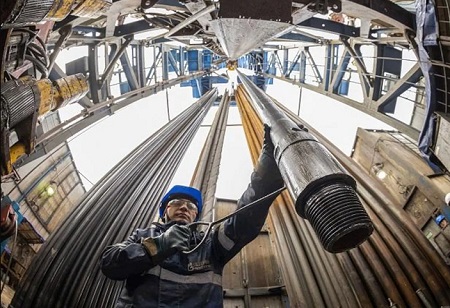Russia is offering India big discounts on the direct purchase of oil as sales to other nations dip following stringent sanctions over its invasion of Ukraine, as per a report on Thursday.
Russia is willing to sell high-grade oil up to $35 per barrel - which could increase to $45 per barrel after the latest surge in global prices - and wants India to buy 15 million barrels in the first deal.
This comes as the United States and United Kingdom say they respect India’s decision to continue to import Russian oil amid the war in Ukraine, but a top US official has said the Biden administration does not want to see a “rapid acceleration” of such purchases.
While the US banned Russian oil and gas imports and European nations have pledged to ease their dependence on supplies from Moscow, India has bought at least 13 million barrels of Russian crude oil since the country invaded Ukraine in late February.
Russia has also offered rupee-ruble-denominated payments using its SPFS financial messaging system - since Moscow has been banned from SWIFT - that could make trading more attractive for India, sources said.
The offer comes a day after foreign minister S Jaishankar, in talks with British foreign secretary Liz Truss, firmly defended India's decision to buy discounted Russian oil - a move criticised by the United States and the United Kingdom.
Jaishankar pointed out Russia sells more to European nations than India and that India welcomes competitive offers to meet burgeoning domestic demand.
"When prices go up, I think it is natural for
countries to look for good deals for their people," he said, pointing to reports that European countries have bought nearly 15 per cent more oil from Russia in March than February.
After the US and China, India is the world's third-largest consumer of oil, over 80% of which is imported.
In 2021, India bought about 12 million barrels of oil from Russia, only 2% of its total imports.
By far the largest supplies last year came from the Middle East, with significant quantities also from the US and Nigeria.
But contracts for March and April have already reached six million barrels, according to data compiled by Kpler, a commodities research group.
The Indian government says even if it buys more oil from Russia, it would "still be a drop, literally a drop, in a larger bucket" of its oil imports globally.
Speaking to reporters in New Delhi on Thursday, Daleep Singh, the US deputy national security adviser for international economics, said Washington was “ready to help India diversify its energy resources, much like is the case for defence resources over a period of time”.
“But there is no prohibition at present on energy imports from Russia,” said Singh, adding that “friends don’t set red lines”.
“What we would not like to see is a rapid acceleration of India’s imports from Russia as it relates to energy or any other exports that are currently being prohibited by us or by other aspects of the international sanctions regime,” he said.
His comments come as British Foreign Secretary Liz Truss and Russian Foreign Minister Sergey Lavrov also are visiting India this week.
Truss met with her Indian counterpart, Subrahmanyam Jaishankar, on Thursday and discussed ways to strengthen defence ties, apparently to reduce India’s strategic dependence on Russia, officials said.
Like Singh, Truss said the UK respected India’s decision to buy Russian supplies. “I think it’s very important that we respect other countries’ decisions about the issues that they face; India is a sovereign nation. I’m not going to tell India what to do,” she told reporters.
Global oil prices have surged since Russia invaded Ukraine on Feb 24, with brent crude hitting record highs. Prices have dropped since; it slid below $100 per barrel after 'meaningful' peace talks and the US' release of reserves.
But prices will continue to fluctuate between $100 to $120 a barrel in the weeks ahead, a senior market analyst at Oanda Asia Pacific.
